List of United Kingdom flags
From Wikipedia, the free encyclopedia
This list includes flags that either have been in use or are currently used by the United Kingdom, British Overseas Territories and the Crown Dependencies.

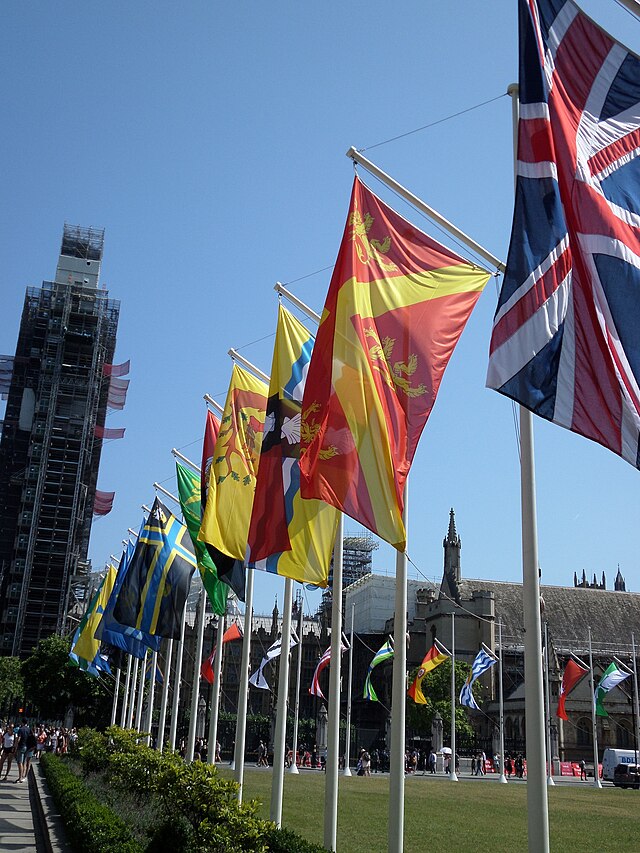
The College of Arms is the authority on the flying of flags in England, Wales and Northern Ireland and maintains the only official register of flags for these countries.[1] It was established in 1484 and as part of the Royal Household operates under the authority of the Crown.[1] The Lord Lyon King of Arms, established prior to 1399, holds a similar role within Scotland.[2] A separate private body called the Flag Institute, an educational charity financed by its own membership, also maintains a registry of United Kingdom flags that it styles 'the UK Flag Registry', though this has no official status under UK law.[3]
Flags recognised by planning law
Certain classes of flag enjoy a special status within English planning law and can be flown without needing the planning permission normally required for advertisements. These include any country’s national flag, civil ensign or civil air ensign; the flag of the Commonwealth, the United Nations or any other international organisation of which the United Kingdom is a member; a flag of any island, county, district, borough, burgh, parish, city, town or village within the United Kingdom; the flag of the Black Country, East Anglia, Wessex, any Part of Lincolnshire, any Riding of Yorkshire or any historic county within the United Kingdom; the flag of St David; the flag of St Patrick; the flag of any administrative area within any country outside the United Kingdom; any flag of the British Armed Forces; and the Armed Forces Day flag.[4]
Current national flags
Summarize
Perspective
National and subnational flags of the United Kingdom.[5]
United Kingdom
| Flag | Date | Use | Description | Status |
|---|---|---|---|---|
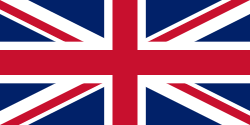  | since 1801 | The Union Flag, also commonly known as the Union Jack.[6] Used as the flag of the United Kingdom | A superimposition of the flags of England and Scotland with the Saint Patrick's Saltire (representing the Kingdom of Ireland). | National flag used by government and civilian population. A 1:2 ratio is the most common.[7] |
  | Vertical national flag used by government and civilian population. |
Constituent countries of the United Kingdom
| Flag | Date | Use | Description | Status |
|---|---|---|---|---|
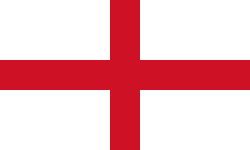 | c. 1348[8] | Flag of England, also known as the St George's Cross | Argent a cross Gules | National flag of England also used by the Church of England, sports teams representing England and ordinary citizens. |
 | 1924–1972 unofficial since 1972 | Flag of Northern Ireland, also known as the Ulster Banner | Six-pointed star bearing the Red Hand of Ulster | Northern Ireland has no official nor universally accepted flag.[9] The Ulster Banner portrayed here is from the former coat of arms of Northern Ireland and was the flag of the Government of Northern Ireland between 1924 and 1972. Since 1972 this flag has continued to be used for want of another distinctive flag, almost exclusively amongst the Unionist community. The flag is commonly used for sporting events and teams from Northern Ireland, most notably in the Commonwealth Games, the Northern Ireland national football team and events where Northern Irish competitors represent the province specifically such as snooker, darts and golf. |
 | c. 1542 (variants first appeared c. 1286)[10] | Flag of Scotland, also known as the St Andrew's Cross, or the Saltire | Azure a saltire Argent | National flag used by Scottish Government and agencies, sports teams representing Scotland and by ordinary citizens. |
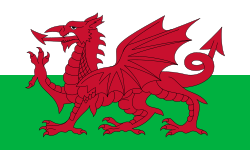 | c. 1807 (variants first appeared c. 1485) | Flag of Wales, also known as the Red Dragon or Y Ddraig Goch | Per fess Argent and Vert, a dragon passant Gules | National flag used by the Welsh Government and agencies, sports teams representing Wales and by ordinary citizens. |
The flags of England and of Scotland are ancient war flags which became by usage the national flags of the Kingdom of England (which included Wales) and of the Kingdom of Scotland respectively and continued in use until the Act of Union 1707. Thereafter, they were as de facto flags of those parts of the United Kingdom. The flag of Wales was formalised in 1959, but has ancient origins; the dragon was used as a battle-flag by countless Welsh rulers, the current flag being a redesign of the flag carried by Henry Tudor.[11] The Flag of Northern Ireland is controversial.[12] The coat of arms of the Government of Northern Ireland, a red cross on a white field, defaced with a Red Hand of Ulster within a six pointed star topped with a crown, became used as a local flag, though the end of the province's Government in 1973 ended its official status. This flag has continued to be the internationally recognisable de facto flag of Northern Ireland through its use by international sporting organisations (for example FIFA,[13] UEFA,[14] and the Commonwealth Games)[15] to represent Northern Ireland, though locally it has the allegiance mainly of the Unionist community. The St Patrick's Saltire is also sometimes used by the UK government in London to represent Northern Ireland when a discrete Northern Ireland flag is required.[16][17]
Crown Dependencies
| Flag | Date | Use | Description |
|---|---|---|---|
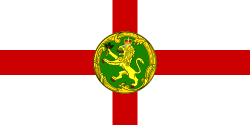 | 1993–present | Flag of Alderney | A red cross on a white field (St George's Cross) with an inescutcheon of the island's coat of arms. Alderney is an autonomous Crown Dependency and is part of the Bailiwick of Guernsey. |
 | Government Ensign of Alderney | A blue ensign with the arms of Alderney. | |
 | 1936–1985 | Flag of Guernsey | A red cross on a white field (St George's Cross). |
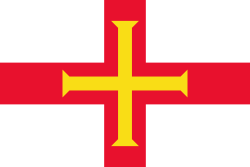 | 1985–present | Flag of Guernsey | A golden cross within a red cross on a white field (St George's Cross). Guernsey is an autonomous Crown Dependency and is part of the Bailiwick of Guernsey. |
 | 1985–present | Civil Ensign of Guernsey | A red ensign with a Gold Cross. |
 | 1985–present | State Ensign of Guernsey | A blue ensign with a Gold Cross. |
 | c.1950–1953 | Flag of Herm | A dark blue field with the arms of Guernsey in the hoist and the words "HERM ISLAND" beneath it. |
 | c.1953–present | Flag of Herm | A red cross on a white field (St George's Cross) with the coat of arms of the island in the canton. Herm is an island which belongs to the Bailiwick of Guernsey. |
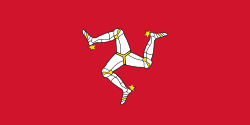 | 1931–present | Flag of the Isle of Man | A triskelion on a red field. |
 | 1971–present | Civil Ensign of the Isle of Man | A red ensign with a triskelion. |
 | before 1981 | Flag of Jersey | A red saltire on a white field. |
 | 1981–present | Flag of Jersey | A red saltire on a white field defaced with the island's badge |
 | 2010–present | Civil Ensign of Jersey | A Red Ensign with the coat of arms of Jersey on. |
 | 1907–present | Government Ensign of Jersey | A blue ensign with the arms of Jersey. |
| 2010–present | Storm Flag of Jersey | A long white pennant with a red border along the top and bottom, and the arms of Jersey in the hoist.[18] | |
 | 2019–present | Flag of Lihou | A green flag with a white stripe in the hoist, with the name "The Lihou Charitable Trust" in white on the green field, and a black and white Eurasian oystercatcher flying eastwards on the white stripe.[19] |
 | 1938–2020 | Flag of Sark | A red cross on a white field (St George's Cross) with two lions (the arms of the Plantagenet Dukes of Normandy) in the canton overflowing the red cross. Strictly speaking, this was the personal flag of the Seigneur. |
 | 2020–present | Flag of Sark | A red cross on a white field (St George's Cross) with two lions (the arms of the Plantagenet Dukes of Normandy) in the canton. Strictly speaking, this was the personal flag of the Seigneur. Sark is an autonomous Crown Dependency and is part of the Bailiwick of Guernsey. |
Parishes of Guernsey
| Flag | Date | Use | Description |
|---|---|---|---|
 | Flag of Castel | ||
 | Flag of Forest | A white flag defaced in the centre with a dark green shield containing a gold Shield of the Trinity. | |
 | Flag of Saint Andrew | ||
 | Flag of Saint Martin | ||
 | Flag of Saint Peter Port | A white flag with the shield of the parish in the centre, consisting of the coat of arms of Guernsey surrounded by a blue and silver ring bearing the name "ST PIERRE PORT GUERNSEY". | |
 | Flag of Saint Pierre du Bois | A flag coloured two-thirds dark blue and one-third light blue (at the top), with a brown and green tree in the light blue section and a pair of crossed gold and silver keys (the Keys of Heaven) in the dark blue section. | |
 | Flag of Saint Sampson | ||
 | Flag of Saint Saviour | ||
 | Flag of Torteval | A white flag with a red field in the canton containing a gold Norman cross. At the bottom of the flag are three blue waves, with a red ship with four white sails sailing eastwards on the top wave. Below the ship is a gold scroll bearing the name "TORTEVAL", and behind the ship is a green shoreline, above which a grey gull is flying downwards. Above the gull is a grey skyline. | |
 | Flag of Vale |
Parishes of Jersey
| Flag | Date | Use | Description |
|---|---|---|---|
 | Flag of Grouville | A white flag with a shield in the centre containing eight horizontal stripes of white and red. | |
 | Flag of Saint Brelade | A silver fish on a blue field. | |
 | Flag of Saint Clement | A golden anchor on a blue field. | |
 | Flag of Saint Helier | Two crossed gold axes on a blue field. | |
 | Flag of Saint John | A silver Maltese cross on a green field. | |
 | Flag of Saint Lawrence | A black gridiron on a white field. | |
 | Flag of Saint Martin | A red flag with a shield in the centre containing seven horizontal stripes of white and red (four white and three red). | |
 | Flag of Saint Mary | A silver fleur-de-lis on a blue field. | |
 | Flag of Saint Ouen | A gold Latin cross on a blue field. | |
 | Flag of Saint Peter | Two crossed silver keys (the Keys of Heaven) on a red field. | |
 | Flag of Saint Saviour | Three golden Holy Nails surrounded by a golden crown of thorns on a red field. | |
 | Flag of Trinity | A silver and gold Shield of the Trinity with black text on a green field. |
British Overseas Territories
Summarize
Perspective
In 1999, the maritime flags of the British Overseas Territories were updated at the request of the Ministry of Defence.[citation needed] The white discs were removed from the field of the flags and each respective coat of arms was increased in size for ease of identification. As the MoD only had authority over sea flags, the governments of the Overseas Territories were free to continue using the flags with white discs on land. The Overseas Territories' governments did switch to the updated flags over a staggered period of time, however some old-style flags with white discs may still be seen. Such flags have generally been adopted by Order in Council. Civil (Red Ensign) flags are under the control of the United Kingdom Secretary of State for Transport and are split into two categories: Category 1 is to register ships of unlimited tonnage and type. Category 2 is to register commercial ships and yachts of up to 150 gross registered tons.[20]
| Flag | Date | Use | Description |
|---|---|---|---|
 | 1990–present | Anguilla | A blue ensign defaced with the Coat of arms of Anguilla |
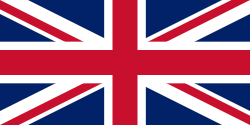 | Flag used in Akrotiri and Dhekelia | The Union Jack is used as no territory flag exists | |
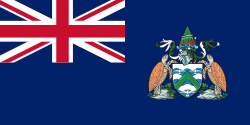 | 2013–present | Ascension Island, a constituent part of Saint Helena, Ascension and Tristan da Cunha | A blue ensign defaced with the Coat of arms of Ascension Island |
 | 1999–present | Bermuda[21] | A red ensign defaced with the Coat of arms of Bermuda. Used on land and as the civil ensign. (Government ensign is blue.) |
 |
A blue ensign defaced with the Coat of arms of Bermuda. Used as the Government ensign. | ||
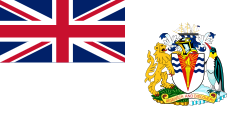 | 1963–present | British Antarctic Territory | A white ensign less the cross of St George defaced with the Coat of arms of the British Antarctic Territory |
 |
A blue ensign defaced with the Coat of arms of the British Antarctic Territory | ||
 | 1990–present | British Indian Ocean Territory | A blue ensign with white wavy lines, defaced with the Coat of arms of the British Indian Ocean Territory. |
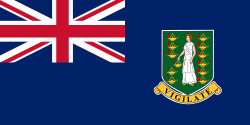 | 1960–present | British Virgin Islands | A blue ensign defaced with the Coat of arms of the British Virgin Islands. Used on land and as the government ensign. The civil ensign is red. |
 |
A red ensign defaced with the Coat of arms of the British Virgin Islands. Used on land and as the civil ensign. | ||
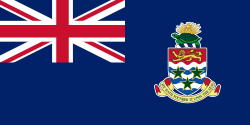 | 1999–present | Cayman Islands | A blue ensign defaced with the Coat of arms of the Cayman Islands. Used on land and as the government ensign. The civil ensign is red. |
 |
A red ensign defaced with the Coat of arms of the Cayman Islands. Used on land and as the civil ensign. | ||
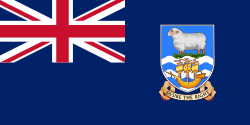 | 1999–present | Falkland Islands | A blue ensign defaced with the Coat of arms of the Falkland Islands. Used on land and as the government ensign. The civil ensign is red. |
 |
A red ensign defaced with the Coat of arms of the Falkland Islands. Used on land and as the civil ensign. | ||
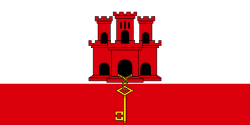 | 1982–present | Gibraltar[22] | Two horizontal bands of white (top, double width) and red with a three-towered red castle in the centre of the white band; hanging from the castle gate is a gold key centred in the red band. This is the flag commonly used on land. |
 | 1999–present | A blue ensign defaced with the badge of Gibraltar in the fly. This is the ensign for vessels owned by the Government, or in Government service. | |
 | 1996–present | A red ensign defaced with the badge of Gibraltar in the fly. Used as the civil ensign for locally registered vessel. | |
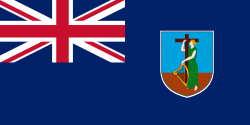 | 1999–present | Montserrat | A blue ensign defaced with the Coat of arms of Montserrat |
 | 1984–present | Pitcairn Islands | A blue ensign defaced with the Coat of arms of the Pitcairn Islands |
 | 1984–present | Saint Helena, a constituent part of Saint Helena, Ascension and Tristan da Cunha | A blue ensign defaced with the Coat of arms of Saint Helena |
 | 1985–present | South Georgia and the South Sandwich Islands | A blue ensign defaced with the Coat of arms of South Georgia and the South Sandwich Islands |
 | 2002–present | Tristan da Cunha, a constituent part of Saint Helena, Ascension and Tristan da Cunha | A blue ensign defaced with the Coat of arms of Tristan da Cunha |
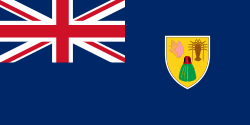 | 1968–present | Turks and Caicos Islands | A blue ensign defaced with the Coat of arms of the Turks and Caicos Islands |
 |
A red ensign defaced with the Coat of arms of the Turks and Caicos Islands |
Governors' flags
Prior to 1999, all governors' flags had smaller discs and the outer green garland without the gold ring. Therefore, the dates given do not reflect this minor, consistent change.
| Flag | Date | Use | Description |
|---|---|---|---|
 | 1990–present | Personal flag of the governor of Anguilla | A Union Jack defaced with the coat of arms of Anguilla |
 | Before 2011 | Personal flag of the governor of Bermuda | A Union Jack defaced with the coat of arms of Bermuda |
 | 1962–present | Personal flag of the commissioner of the British Antarctic Territory | A Union Jack defaced with the coat of arms of the British Antarctic Territory |
 | 1990–present | Flag of the commissioner of the British Indian Ocean Territory | A design based on the Blue Ensign with a Union Jack in the union and wavy white lines going horizontally along the field, defaced with the coat of arms of the British Indian Ocean Territory. This flag is also used as the de facto flag of the Territory. |
 | 1971–present | Personal flag of the governor of the British Virgin Islands | A Union Jack defaced with the coat of arms of the British Virgin Islands |
 | 1971–present | Personal flag of the governor of the Cayman Islands | A Union Jack defaced with the coat of arms of the Cayman Islands |
 | 1948–present | Personal flag of the governor of the Falkland Islands | A Union Jack defaced with the coat of arms of the Falkland Islands |
 | Before 2011 | Personal flag of the governor of Gibraltar | A Union Jack defaced with the coat of arms of Gibraltar |
 | Before 2011 | Personal flag of the governor of Montserrat | A Union Jack defaced with the coat of arms of Montserrat |
 | Before 2011 | Personal flag of the governor of the Pitcairn Islands | A Union Jack defaced with the coat of arms of the Pitcairn Islands |
 | Before 2011 | Personal flag of the governor of Saint Helena | A Union Flag defaced with the coat of arms of Saint Helena |
 | 1999–present | Personal flag of the commissioner for South Georgia and the South Sandwich Islands | A Union Jack defaced with the coat of arms of South Georgia and the South Sandwich Islands |
 | 2002–present | Personal flag of the governor of Tristan da Cunha, also used by the Administrator of Tristan da Cunha | A Union Jack defaced with the coat of arms of Tristan da Cunha. |
 | Before 2011 | Personal flag of the governor of the Turks and Caicos Islands | A Union jack defaced with the coat of arms of the Turks and Caicos Islands |
Municipal flags
| Flag | Date | Use | Description |
|---|---|---|---|
 | Flag of Hamilton, Bermuda | ||
 | Flag of St. George's, Bermuda |
Ensigns
| Flag | Date | Use | Description |
|---|---|---|---|
 | 1801 on | Blue Ensign, used by some organisations or territories associated with the UK and also used by Royal Navy Reserve (not for some time) Captain of Merchant Navy Ship – e.g., RMS Queen Mary | A blue field, with a Union Jack in the canton |
 | 1864 on | Government Service Ensign (previously the Transport Ensign or Admiralty Ensign) | A blue ensign defaced with a horizontal yellow anchor |
 | 1801 on | Red Ensign, used by the Merchant Navy | A red field, with a Union Jack in the canton |
 | Civil Jack | A Union Jack with a white border | |
 | The Ensign of Trinity House | Red Ensign defaced with the shield of the coat of arms (a St George's Cross with a sailing ship in each quarter). The Master and Deputy Master each have their own flags. | |
 | Royal National Lifeboat Institution | ||
 | 1994 | Maritime Volunteer Service | |
 | Company of Watermen and Lightermen | ||
 | Ensign of the Commissioners of Irish Lights, used by CIL vessels in Northern Ireland | The blue ensign defaced with the commissioners' badge in the fly. | |
 | 2006 | Ship of the National Historic Fleet | |
 | 2006 | Registered vessel of the National Historic Ships UK | |
 | 1931 on | Civil Air Ensign, used by civilian aircraft and at civil airports | A blue and white cross on a light blue field with the Union Jack in the canton |
 | Dunkirk Jack, used by Member Ships of the Association of Dunkirk Little Ships, which consists of civilian vessels that participated in the Dunkirk evacuation. | The Cross of Saint George defaced with the Arms of Dunkirk. | |
 | Unofficial Cornish ensign (or St Piran's Ensign)[23] | The Cornish flag defaced with a Union flag in the canton. | |
 | 2000 | Another unofficial Cornish ensign flown by the ship 'Sweet Promise' during the 'Brest 2000' festival. | The Cornish flag defaced with the Standard of the Duke of Cornwall in the canton. |
 | 2003 | Unofficial Devon Ensign (or St Petroc's Ensign) | The Devon flag defaced with a Union flag in the canton. |
 | 2023 | Unofficial Warwickshire ensign found within Etone College | St. George's Cross defaced with a Bear and Ragged Staff in the canton. |
Naval Service
| Flag | Date | Use | Description |
|---|---|---|---|
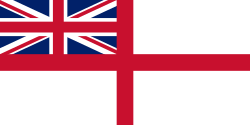 | 1801 on | White Ensign, Royal Navy, usually ships bearing the prefix HMS (but see blue ensign), and the Royal Yacht Squadron | A red cross on a white field with the Union Jack in the canton |
 | 1968 on | Ensign of the Royal Fleet Auxiliary | A blue ensign defaced with a vertical yellow anchor |
 | 1974–2008 | Ensign of the Royal Maritime Auxiliary Service | A blue ensign defaced with a horizontal yellow anchor with two wavy yellow lines beneath |
 | 1963 on | Ensign of the Royal Naval Auxiliary Service | A blue ensign defaced with the shield of the Royal Naval Auxiliary Service |
 | Combined Cadet Force Naval Section Ensign | RNR Blue Ensign with CCF Naval Section badge | |
 | Since 1942 | Sea Cadet Corps Ensign | RNR Blue Ensign with SCC badge |
 | Flag of the Lord High Admiral of the United Kingdom | A fouled anchor on a crimson background | |
 | Flag of the Corps of His Majesty's Royal Marines | A dark blue field with unequal horizontal yellow, green and red stripes, and the crest of the Royal Marines. | |
 |
Flag of the Commandant General Royal Marines | A dark blue field with a fouled anchor, lion and crown. | |
 | King's Colour for the Royal Navy | A White Ensign defaced in the centre of the cross with a garter of the Order of the Garter encircling the Royal Cypher of King Charles III and surmounted by a Tudor Crown. |
Army
| Flag | Date | Use | Description |
|---|---|---|---|
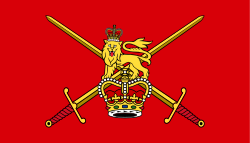 | Non-Ceremonial Flag of the British Army | A red field defaced with the badge of the British Army. | |
 | 1838 on | Ensign of the Corps of Royal Engineers | A blue government ensign defaced with the crest of the coat of arms of the Board of Ordnance. |
 | 1952–2022 | Camp Flag of the Royal Engineers | |
 | 2022 on | Camp Flag of the Royal Engineers | |
 | Ensign of the Royal Logistic Corps for use on vessels commanded by a commissioned officer. | A blue government ensign defaced with the British Army badge of a crown and lion in front of crossed swords. | |
 | Ensign of the Royal Logistic Corps for use on vessels under command of a non-commissioned officer. | A blue government ensign defaced by British Army crossed swords. |
Air Force
| Flag | Date | Use | Description |
|---|---|---|---|
 | 1921 on | Royal Air Force Ensign | A RAF light blue field with the Royal Air Force roundel in the fly with a Union Jack in the canton |
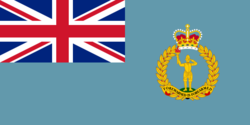 | 1945–1996 | Royal Observer Corps Ensign | RAF Ensign with RAF roundel replaced by ROC badge |
 | Air Training Corps Ensign | RAF Ensign with RAF roundel replaced by ATC badge | |
 | King's Colour for the Royal Air Force |
Combined Forces
| Flag | Date | Use | Description |
|---|---|---|---|
 | 1956 on | Flag of the Joint Services | A dark blue, red and light blue tricolour defaced with the Joint Service badge. A simplified version with the badge in black is also in use. The tricolour is a combination of the colours of the Armed Forces. |
 | Flag of the Secretary of State for Defence | A dark blue, red and light blue horizontal tricolour defaced with a crown and lion. The tricolour is a combination of the colours of the Armed Forces. | |
 | 1965 on | Flag of the Chief of the Defence Staff | A dark blue, red and light blue horizontal tricolour with a Union canton and defaced with the badge of the Chief of the Defence Staff. The tricolour is a combination of the colours of the Armed Forces. |
 | 1971 on | Ensign of the Ministry of Defence Police | A blue ensign defaced with the badge of the Ministry of Defence Police. |
Yacht club ensigns
| Flag | Burgee | Use | Description |
|---|---|---|---|
 |  | Ensign of the Royal Yacht Squadron | The same as the Naval Ensign of the United Kingdom. |
 | Ensign of the Royal Naval Sailing Association | Blue Ensign. | |
 |  | Ensign of the Royal Naval Volunteer Reserve Yacht Club | Blue Ensign. |
 |  | Ensign of the Royal Southern Yacht Club | Blue Ensign. |
 |  | Ensign of the Royal Northern and Clyde Yacht Club | Blue Ensign. |
 |  | Ensign of the Royal Thames Yacht Club | Blue Ensign. |
 |  | Ensign of the Royal Southampton Yacht Club | The blue ensign defaced with a crown in the middle of the Union Jack. |
 |  | Ensign of the HMS Conway Cruising Association | Blue Ensign, defaced with the Conway Castle Badge. |
 |  | Ensign of the Little Ship Club | Blue Ensign, defaced with the LSC Emblem. |
 |  | Ensign of the Poole Yacht Club | The blue ensign with a defaced with the emblem of Poole Yacht Club. |
 | Ensign of the Portsmouth Yacht Club | The blue ensign defaced with the emblem of Portsmouth Yacht Club. | |
 | Ensign of the Royal Channel Islands Yacht Club | The blue ensign with a defaced the coat of arms of Jersey. | |
 |  | Ensign of the Royal Corinthian Yacht Club | The blue ensign with a defaced with the emblem of Royal Corinthian Yacht Club. |
 |  | Ensign of the Royal Cornwall Yacht Club | Blue Ensign, defaced with the Prince of Wales's feathers heraldic badge. |
 | Ensign of the Royal Forth Yacht Club | The blue ensign defaced by a Cross pattée, surmounted by the Crown of Scotland. | |
 |  | Ensign of the Royal Gibraltar Yacht Club | The blue ensign defaced with the coat of arms of Gibraltar. |
 | Ensign of the Royal Harwich Yacht Club | The blue ensign defaced with a yellow rampant lion. | |
 |  | Ensign of the Royal North of Ireland Yacht Club | The blue ensign defaced in the fly with a yellow shamrock surmounted by a Saint Edward's Crown. |
 |  | Ensign of the Royal Ulster Yacht Club | The blue ensign defaced with the Red Hand of Ulster and St Edward's Crown. |
 |  | Ensign of the Royal Yorkshire Yacht Club | The blue ensign defaced in the fly with the White Rose of York surmounted by a Saint Edward's Crown. |
 | Ensign of the Sussex Yacht Club | The blue ensign with a defaced with the emblem of Sussex Yacht Club. | |
 | Ensign of the House of Commons Yacht Club | ||
 |  | Ensign of the Royal Dart Yacht Club | The red ensign defaced with a Royal Crown and a left pointed arrow under the Crown. |
 |  | Ensign of the Royal Fowey Yacht Club | The red ensign defaced with the Coronet of the Duke of Cornwall over the Shield of the Duchy of Cornwall. |
 | Ensign of Royal Hamilton Amateur Dinghy Club | ||
 |  | Ensign of the Royal Norfolk and Suffolk Yacht Club | |
 |  | Ensign of the Royal Victoria Yacht Club | The red ensign defaced with a Royal Crown and the letters 'VR' -Victoria Regina. |
 |  | Ensign of the Royal Windermere Yacht Club | The red ensign defaced with a Royal Crown. |
 | Ensign of the Royal Yacht Association | The red ensign defaced with a Naval Crown. | |
 | Ensign of the St Helier Yacht Club | The red ensign defaced with an anchor and two crossed axes. | |
 |  | Ensign of the West Mersea Yacht Club | The red ensign deface with three swords (Essex symbol). |
 | Ensign of the Royal Air Force Sailing Association | The RAF Ensign defaced with an eagle. | |
 | Burgee of the Cargreen Yacht Club | A green burgee defaced with a red brick chimney outlined in black in the hoist. | |
 | Burgee of the Flushing Sailing Club | A black burgee defaced with a gold letter "V". | |
 | Burgee of the Helford River Sailing Club | A blue burgee divided by a red cross outlined in white, with a gold ship in the centre. | |
 | Burgee of the Island Cruising Club of Salcombe | A green burgee defaced with the initials "ICC" in gold. | |
 | Burgee of the Looe Sailing Club | A diagonally divided burgee of seven red and yellow stripes (four red and three yellow) defaced with a black silhouette of a ship on the waves. | |
 | Burgee of the Mount's Bay Sailing Club | ||
 | Burgee of the Mylor Yacht Club | A white burgee divided by a red Saint George's Cross with the shield from the arms of the Duchy of Cornwall in the canton. | |
 | Burgee of the Padstow Sailing Club | A white burgee defaced with a red-and-white fish and surrounded by a blue border. | |
 | Burgee of the Penzance Sailing Club | A black burgee divided by a white Saint Piran's Cross, with a black skull and crossbones on a white disc in the centre. | |
 | Burgee of the Port Navas Yacht Club | A black burgee with the white-coloured initials "PNYC" arranged vertically in the hoist and separated from the rest of the burgee by a vertical white line, and the rest of the burgee divided by a white Saint Piran's Cross with a gold ship's wheel to the upper left of the cross. | |
 | Burgee of the Porthpean Sailing Club | A blue burgee divided by a white cross, defaced in the centre with a white shield bearing a red saltire. | |
 | Burgee of The Quay Sailing Club | A white burgee with a crimson border, defaced with a white shield containing three black bells (two above and one below) in the hoist, and the black-coloured initials "Q.S.C." in the fly. | |
 | Burgee of the Restronguet Sailing Club | A blue burgee defaced with a white seashell and surrounded by a white border. | |
 | Burgee of the Rock Sailing and Waterski Club | A yellow burgee defaced with a black silhouette of a camel. | |
 | Burgee of the St Ives Sailing Club | ||
 | Burgee of the St Mawes Sailing Club | A white-and-red quartered burgee with the shield from the arms of the Duchy of Cornwall in the canton. | |
 | Burgee of the Saltash Sailing Club | ||
 | Burgee of the Torpoint Mosquito Sailing Club | A dark blue burgee divided by a white cross and defaced with a red diamond in the centre. |
Royal Standards
King Charles III
| Flag | Date | Use | Description |
|---|---|---|---|
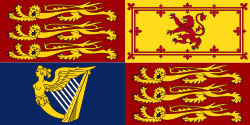 | 1801 (original version) 1837(removed Hanover arms) | The Royal Standard of the United Kingdom (except Scotland) | A banner of the King's Arms, the Royal Coat of Arms of the United Kingdom |
 | 1801 (original version) 1837(removed Hanover arms) | The Royal Standard of the United Kingdom (only Scotland) | A banner of the King's Arms used in Scotland, the Royal Coat of Arms of the United Kingdom used in Scotland |
Standards and banners of the Prince of Wales
| Flag | Date | Use | Description |
|---|---|---|---|
 | Standard of the Prince of Wales, used in England and Northern Ireland | A banner of the Coat of Arms of the Prince of Wales, the Royal Coat of Arms of the United Kingdom defaced with a label of three points. | |
 | Standard of the Prince of Wales as Duke of Cornwall | 15 golden circles (bezants) on a black field | |
 | Standard of the Prince of Wales as Duke of Rothesay. | The Royal Banner of Scotland defaced with a label of three points.[24] | |
 | Banner of the Prince of Wales as Duke of Rothesay | Banner of the Duke's Arms, 1st and 4th quarters representing the title of Great Steward of Scotland, the 2nd and 3rd quarters representing the title of Lord of the Isles. In the centre on an inescutcheon the arms of the heir apparent to the King of Scots | |
 | 1962 on | Banner of the Prince of Wales, used in Wales | A banner of the Coat of Arms of Wales. In the centre on an inescutcheon the coronet of the Prince of Wales |
Other members of the Royal Family
| Flag | Date | Use | Description |
|---|---|---|---|
 | 2024 on | Standard of Queen Camilla, consort of Charles III | Banner of the Royal Coat of Arms of the United Kingdom impaling the arms of Bruce Shand |
 | 2022 on | Standard of The Duke of Sussex | Banner of the Duke's Coat of Arms, the Royal Coat of Arms of the United Kingdom with a three-point label bearing Escallops in reference to the arms of Diana, Princess of Wales |
 | 1978 on | Standard of The Duke of York | Banner of the Duke's Coat of Arms, the Royal Coat of Arms of the United Kingdom with a three-point label, the centre label bearing a blue anchor |
 | 2006 on | Standard of Princess Beatrice, Mrs Edoardo Mapelli Mozzi | Banner of the Princess's Coat of Arms, the Royal Coat of Arms of the United Kingdom with a five-point label with three bees in alternating points |
 | 2008 on | Standard of Princess Eugenie, Mrs Jack Brooksbank | Banner of the Princess's Coat of Arms, the Royal Coat of Arms of the United Kingdom with a five-point label with three thistle heads in alternating points |
 | Standard of The Duke of Edinburgh | Banner of the Duke's Coat of Arms, the Royal Coat of Arms of the United Kingdom with a three-point label, the centre label bearing a Tudor Rose | |
 | Standard of The Princess Royal | Banner of the Princess's Coat of Arms, the Royal Coat of Arms of the United Kingdom with a three-point label, the first and third labels bearing a red cross, the centre label bearing a red heart. | |
 | 1962 on | Standard of The Duke of Gloucester | Banner of the Duke's Coat of Arms, the Royal Coat of Arms of the United Kingdom with a five-point label, the first, third and fifth labels bearing a red cross, the second and fourth labels bearing a red lion. |
 | Standard of The Duke of Kent | Banner of the Duke's Coat of Arms, the Royal Coat of Arms of the United Kingdom with a five-point label, the first, third and fifth labels bearing a blue anchor, the second and fourth labels bearing a red cross. | |
 | Standard of Prince Michael of Kent | Banner of the Prince's Coat of Arms, the Royal Coat of Arms of the United Kingdom with a five-point label, the first, third and fifth labels bearing a red cross, the second and fourth labels bearing a blue anchor. | |
 | 1961 on | Standard of Princess Alexandra, The Honourable Lady Ogilvy | Banner of the Princess's Coat of Arms, the Royal Coat of Arms of the United Kingdom with a five-point label, the first and fifth labels bearing a red heart, the third label bearing a red cross, the second and fourth labels bearing a blue anchor. |
Others
| Flag | Date | Use | Description |
|---|---|---|---|
 | 1323 on | The Royal Banner of Scotland | A banner of the ancient Royal Arms of Scotland, now officially used in Scotland by representatives of the sovereign, including the First Minister of Scotland (as keeper of the Great Seal of Scotland), the Lord High Commissioner to the General Assembly of the Church of Scotland, the Lord Lyon King of Arms and Lord-Lieutenants within their lieutenancies.[25] This flag is also used at the Royal residences of Holyrood Palace and Balmoral Castle when the sovereign is not present. |
 | Flag used by the Lord-Lieutenants, the sovereign's representative in the counties of the United Kingdom, except by those in Scotland (see above). | The Union Jack, defaced with a sword, crowned. | |
 | Standard of the Duchy of Lancaster | The Royal Banner of England, with a three-point label, each containing three fleurs-de-lis | |
 | Standard of the Lord Warden of the Cinque Ports | A banner of the Lord's coat of arms featuring three Lions passant guardant con-joined to these hulls, all in gold |
Government
| Flag | Date | Use | Description |
|---|---|---|---|
 | 2021 | Flag of the House of Commons | A gold parliamentary portcullis and coronet (set slightly left of centre) on a field of green. |
 | Ensign of HM Revenue & Customs | A Blue Ensign defaced with the badge of HM Customs and Excise | |
 | Flag of the Senedd Cymru.[26] | White with the logo of the Senedd Cymru in red | |
 | 1998 | Flag of the Northern Ireland Assembly.[27] | White with the logo of the Northern Ireland Assembly in blue |
| 2008 | Ensign of the Border Force | A Blue Ensign defaced with the badge of the Border Force | |
 | Ensign of HM Coastguard | A blue ensign defaced with the badge of HM Coastguard | |
 | Ensign used aboard ships of the Scottish Government, such as the patrol boats of the Marine Scotland. | A blue ensign defaced with the badge of the former Scottish Fisheries Protection Agency | |
 | Ensign of the Commissioners of the Northern Lights | A blue ensign defaced with a lighthouse | |
 | Northern Lighthouse Board Commissioners Flag | A White Ensign with a pre-1801 Union Flag in the canton, defaced with a blue lighthouse in the fly, is the only British flag to still use the pre-1801 Union Flag.[28] This flag is only flown from vessels with the Commissioners aboard and from the Headquarters of the NLB, in Edinburgh. | |
 | Ensign of Trinity House | A red ensign defaced with a Trinity House Jack | |
 | Flag of the Metropolitan Police | The Badge of the Metropolitan Police on a blue background, with white squares at the edge | |
 | Ensign of the Metropolitan Police | The Blue Ensign, defaced with the Badge of the Metropolitan Police. | |
 | 1943–1945 1949–1968 | Flag of the Civil Defence Service/Civil Defence Corps | A blue and yellow flag defaced with a Tudor Crown and the letters C.D. |
 | 2017 | Ensign used aboard ships of the Welsh Government, such as the patrol boats of the Marine and Fisheries Division. | A blue ensign defaced with a yellow dragon |
Church
| Flag | Date | Use | Description |
|---|---|---|---|
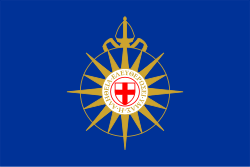 | Flag of the Anglican Communion | A dark blue background with the symbol of the Anglican Communion (a compass rose surmounted by a bishop's mitre; in the centre is a cross of St George). The Greek motto, Ἡ ἀλήθεια ἐλευθερώσει ὑμᾶς ("The truth will set you free") is a quotation from John 8:32. | |
 | 1999 on | Flag used by the Church of Ireland | The flag of Saint Patrick is one of two flags authorised for use on Church of Ireland buildings and grounds. The other is that of the Anglican Communion above.[29] |
 | Flag of the Church of Scotland | The flag of Scotland with the burning bush in the centre. | |
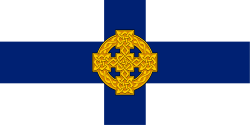 | 1954 on | Flag of the Church in Wales | A navy blue cross with a celtic cross in the centre. |
 | Flag of Westminster Abbey | Tudor arms between Tudor roses, above Edward the Confessor's arms. | |
 | Flag of the Church of St Margaret, Westminster Abbey | A blue flag defaced in the centre with a gold dragon's head pierced by a cross, and a gold crowned portcullis in the canton. | |
 | 2014 on | Flag of Exeter Cathedral | The coat of arms of Exeter Cathedral on a field of blue. |
 | Flag of Southwark Cathedral | A banner of the Cathedral's coat of arms. | |
 | Flag of Worcester Cathedral | The Cross of Saint George defaced with the coat of arms of Worcester Cathedral in the canton. | |
 | 2013 on | Flag of the Church of St James the Great, Birlingham | The Cross of Saint George impaled with a blue field defaced with three gold scallop shells of Saint James (two on the left and one on the right). |
 | Flag of St James Church, Quedgeley[30] | Three gold scallop shells of Saint James (two above and one below) on a field of red. |
Diplomatic flags
| Flag | Date | Use | Description |
|---|---|---|---|
 | Flag used by British Embassies | A Union Jack defaced with the royal coat of arms of the United Kingdom | |
 | Flag used by British High Commissions | High commissions fly the Union Jack | |
 | Flag used by British consulates and consulates-general | A Union Jack defaced with the Royal Crown | |
 | Flag used by British consular officials when embarked in small boats; flag displayed at bow | A Blue Ensign defaced with the royal coat of arms of the United Kingdom |
Communities and local government
Summarize
Perspective
Since 2012 it has been permitted in planning law in England to fly a flag of any British island, county, district, borough, burgh, parish, city, town or village without planning permission as an advertisement.[31] Official bodies such as the Department for Communities and Local Government encourage the use of these flags[32]
Banner of arms (flag form of a coat of arms) have long been used to represent local authority councils and the areas they cover.[33] Some of these include the banners used by Northumberland and Hertfordshire County Councils which before 2012 had already "released" their banners of arms for use as historic county flags, in most cases a historic county flag is derived or (for the two counties) directly adopted.[34]
Community (or civic) flags have also been adopted to cover small areas or places.
Local county
| Flag | Date | Use | Description |
|---|---|---|---|
 | Angus | Consisting of four-quarters containing a red crowned lion passant, a gold cinquefoil, a blue-white checked strip crossed with buckled red belt, and a depiction of the heart of Robert the Bruce to represent the four ancient earldoms of Angus.[35] | |
 | 1974 on | Flag of Cambridgeshire County Council[36] | Banner of the arms adopted after 1974 with elements from the old Cambridgeshire and Isle of Ely CC and Huntingdon and Peterborough CC. |
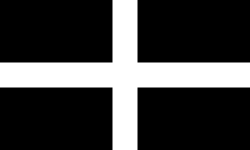 | 12th century | St Piran's Flag – the Flag of Cornwall[37] | A white cross on a black field, formally adopted in 1890 |
 | Defunct | Flag of Cumbria County Council[32] | On the green border are Parnassus flowers (representing Cumberland) interspersed with white roses (Yorkshire) superimposed with red roses (Lancashire). The centre of the shield is made up of segments of blue, white, yellow and green divided by wavy vertical lines and zig-zag horizontal lines. This depicts the new County and from left to right the vertical lines of segments show: blue and white for the sea, blue and yellow (gold) for the lakes and agriculture, green and white for mountains and lakes and green and yellow (gold) for mountains and agriculture. |
 | 1961, altered for post-1974 reform and transferred to unitary authority in 2009 | County Durham District | A yellow cross on a blue field with lions rampant in each quarter from the Bishopric of Durham's arms, black diamonds on each arm (representing coal and industry) added when the arms was originally adopted with a later change to add a white rose of York on a blue square in centre of the cross (the latter added in 1974 to represent the area of Yorkshire in Teesdale administered by the council).[38] |
 | 1889, altered for post-1974 reform | Flag of East Sussex[39] | nine golden birds of Sussex on red with a Saxon crown above, white wave later added between the crown and birds. |
 | Defunct | Flag of Greater London | Adopted by the Greater London Council (1965-1986), this banner of arms is the last official flag of Greater London. The waves are taken from the flag of the former London County Council (1914-1965) and the Saxon crown from the flag of Middlesex. The Greater London Authority (2001-present) uses multiple logo variations but has not officially adopted a flag.[40] |
 | Defunct | Flag of Greater Manchester[41] | Ten golden castles (arranged in rows of 3-2-3-2) on a red background, fringed by a golden border in the style of a castle battlement. |
 | 1992 | Hampshire county banner of armsreg | A gold crown on red above a Lancaster rose on gold, the crown representing the former Saxon kingdom of Wessex and the rose representing England. |
 | for the 1889 council, re-adopted for post-1996 reformed council | Flag of Herefordshire[42] | |
 | 2008 on | Flag of Hertfordshire[37] | On white and blue a waved background, a Hart reclining on a yellow shield, use of blue and yellow is derived from Saint Alban's Cross. |
 | Isle of Wight Council banner of arms[37] | A pale blue field with a nicked rhombus (a representation of the island's shape) and at the bottom six alternating bars wavy, navy blue and white. | |
 | 1903, re-adopted for post-1974 reformed council | Flag of Lancashire County Council | Red with two full width yellow triangles pointing down and one pointing up, a red rose on each yellow triangle. |
 | Leicestershire banner of arms | Flag of the historic county of Leicestershire, registered with the Flag Institute on 16 July 2021[43] | |
 | Defunct | Flag of Merseyside[44] | |
 | Flag of Norfolk County Council[45] | Council banner of arms.
For County flag see Flag of Norfolk | |
 | 1951 | Flag of Northumberland[37] | Local authority flag with use permitted to local people. Based on the St Oswald banner.[46] |
 | Flag of Rutland [citation needed] | ||
 | Defunct | Flag of South Yorkshire | Red and white waves with one and two half black lozenges to represent coal with white roses to represent Yorkshire. |
 | Flag of Staffordshire[47] | All the devices on the flag come from arms of various Earls of Stafford. The red chevron on gold was the arms of the de Staffords. It is charged with the family's famous Stafford knot badge. | |
| Defunct | Flag of Tyne and Wear | A blue field with a white turret in the centre to represent Hadrian's wall with a white wavy line above to represent the rivers.[48] | |
 | 1931 on | Flag of Warwickshire[49] – the Bear and Ragged Staff[50] | A silver bear with red muzzle and gold collar and chain supporting a silver ragged staff on a red shield, with three red crosses (each of which has its arms crossed) on a gold band at the top.[51] |
 | Defunct | Flag of the West Midlands | Banner of arms of the former county council. The flag has two dancetty barrulets interlaced to form a W and M representing the initials of "West Midlands". |
 | Flag of West Sussex[52] | Banner of arms of the local authority. Blue and gold flag with six golden martlets. | |
 | Flag of Worcestershire CC[53] | Banner of arms of the local authority. |
Local district
| Flag | Date | Use | Description |
|---|---|---|---|
 | Flag of Aberdeen[33] | Three White/Grey Castles on a Red Field, taken from the city's coat of arms. | |
 | Flag of Belfast[33] | A banner of the city's coat of arms. (Registered by the Flag Institute)[54] | |
 | Flag of Cardiff | A banner of the city's coat of arms. (Registered by the Flag Institute)[55] | |
 | Flag of Durham[33] | A red cross outlined in white on a black field. | |
 | Flag of Edinburgh[33] | A heraldic flag derived from the arms of Edinburgh Council.[56] (Registered by the Flag Institute)[57] | |
 | Flag of Glasgow | A banner of the city's coat of arms. | |
 | Flag of Lincoln[33] | A banner of the city's coat of arms. | |
 | Flag of the City of London (vertical banner) | Vertical banner of the arms of the City of London Corporation. | |
 | Flag of Plymouth[citation needed] (City and Unitary Authority) | Banner of the arms of Plymouth City Council.[citation needed] | |
 | Flag of Portsmouth[33] | A banner of the city's coat of arms. | |
 | Flag of Shrewsbury[citation needed] | A banner of the town's coat of arms, featuring three leopard faces known locally as loggerheads.[citation needed] | |
 | 2017 | Flag of Southampton[58] | An anchor and Tudor Rose on a red and white background. |
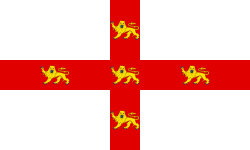 | Flag of York[33] | A banner of the city's coat of arms. |
Civic
| Flag | Date | Use | Description |
|---|---|---|---|
 | Flag of Appleby-in-Westmorland | A golden heraldic apple tree on blue. (Registered by the Flag Institute)[59] | |
 | 1893 | Flag of Bexhill-on-Sea | A red saltire, which divides the flag into four sections: two of them white (top and bottom) and two green (hoist and fly). (Registered by the Flag Institute)[60] |
 | Flag of Birmingham[33] | Golden vertical zig-zag offset to hoist dividing blue and red, with a bulls head in the centre. The flag of city as opposed to the banner of the council. (Registered by the Flag Institute)[61] | |
 | Flag of Calne | Golden circle over green, blue and white stripes. (Registered by the Flag Institute)[62] | |
 | 2018 | Flag of Coventry[63] | Silhouette of Lady Godiva on a white field with two stripes in the traditional shade of Coventry Blue. Updated in 2018 from the 1345 arms flag depicting an Elephant. (Registered by the Flag Institute)[64] |
 | Flag of Craig-y-Dorth (Cwmcarvan) | Two golden wyverns combatant on blue and red, over a golden triangle with a red loaf. (Registered by the Flag Institute)[65]. | |
 | Flag of Digbeth | Triband of blue, thinner black and white with counterchanged rings over the black-white division and ripples beneath. (Registered by the Flag Institute)[66] | |
 | Flag of Evenley | Three golden cowslips on a green hoist, with a dragon slain by Saint George on the yellow field. (Registered by the Flag Institute)[67] | |
 | Flag of Finchfield | Three golden finches with an interlocking pattern of stylised wheat. (Registered by the Flag Institute)[68] | |
 | Flag of Flore | A white blossom flower on purple and a purple plum on gold divided by a diagonal wavy line. (Registered by the Flag Institute)[69] | |
 | Flag of Hampton Poyle | A white saltire on red with a black border with golden bezants. (Registered by the Flag Institute)[70] | |
 | Flag of Horningsea | A potter at his wheel counterchanged across a vertical bisection red and white. (Registered by the Flag Institute)[71] | |
 | Flag of Kingswinford | A white boar with a gold crown on blue. (Registered by the Flag Institute)[72] | |
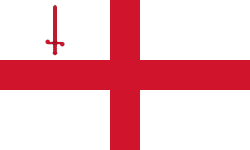 | Flag of the City of London[33] | A red cross on a white field, with a red sword in the canton. A banner of the arms of the City of London Corporation. (Registered by the Flag Institute)[73] | |
 | Flag of Montrose | A red rose on a white field. | |
 | Flag of Nenthead | A green triangle with white eight pointed star over black and white hoops. (Registered by the Flag Institute)[74] | |
 | Flag of Newbury | Red and blue quarters with castle, wheatsheaf, swords and teasel with a wavy hoop across the centre. (Registered by the Flag Institute)[75] | |
 | 2009 | Flag of Newton Abbot | A stylised image of St Leonard's Tower in the centre of a modified flag of Devon. The green represents the moors, the black the granite and the white the clay of the surrounding area. The cross is also used to represent a major crossroads in the town which converged on the clock tower. The arms of the cross represent the routes to Exeter and London, Bovey Tracey and the moors, Totnes and Plymouth, and Torquay and Brixham.[76][77] |
 | Flag of Penrith | A red saltire on white with blue knot/flowers in each quarter. (Registered by the Flag Institute)[78] | |
 | Flag of Petersfield | Crossed keys on a green field with a plain white and wavy blue hoop. (Registered by the Flag Institute)[79] | |
 | Flag of Pewsey | A white horse (Pewsey White Horse) on green hills below an oaken crown. (Registered by the Flag Institute)[80] | |
 | Flag of Poole | Dolphin on wavy black and gold bars below the three scallop shells of St James. (Registered by the Flag Institute)[81] | |
 | Flag of Preston | A blue cross with white arm centres on white with a paschal lamb in the centre. (Registered by the Flag Institute)[82] | |
 | Flag of St Albans[33] – the Cross of St Alban | A golden saltire on sky blue. | |
 | Flag of St Anne's on Sea (Lytham St Annes) | A white Victorian lifeboat in upper hoist above two golden wavy hoops all over blue. (Registered by the Flag Institute)[83] | |
 | Flag of Staining, Lancashire | A white windmill and plough on blue divided by a white diagonal series of rectangles with a blue Celtic cross in the centre. (Registered by the Flag Institute)[84] | |
 | Flag of Stirling | The Scottish flag defaced in the centre of the saltire with the red lion rampant from the Scottish royal banner, with two caltraps in the upper and lower sections, and two spur-rowels in the left and right sections. | |
 | Flag of the stannary town of Tavistock[citation needed] | A white field with a blue bend, defaced with the coat of arms.[citation needed] | |
 | Flag of Tywyn | A black raven on gold and a white dolphin on blue divided by a diagonal wavy line. (Registered by the Flag Institute)[85] | |
 | Flag of Willenhall | Three golden locks on red and a crowned set of golden crossed keys on blue divided by a crenellated vertical line. (Registered by the Flag Institute)[86] | |
 | Flag of Wing, Buckinghamshire | A golden bird in a golden arch all on blue. (Registered by the Flag Institute)[87] | |
 | Flag of Wreay | A golden cross on green with a two crossed white pipes and a bell in the first quarter. (Registered by the Flag Institute)[88] | |
 | Flag of Wroxton | A red cross on blue and fimbriated white with white birds, pick axe, and leaf in the quarters. (Registered by the Flag Institute)[89] |
Islands
| Flag | Date | Use | Description |
|---|---|---|---|
 | 2017 on | Flag of the Isle of Barra | Green, with a white Scandinavian Cross showing the ancestry of the people and places names of Barra. The green represents the green of the Barra Isles.[90] |
 | 9 September 1976 | Flag of the Comhairle nan Eilean Siar (Council of the Western Isles) | Or, on a fess wavy Azure between three lymphads, oars in action, sails furled Sable, flagged Gules, two barrulets wavy Argent. |
 | 1954–1969 2010 on | Flag of Lundy | A blue flag with a white letter "L" on the hoist side.[91][92] |
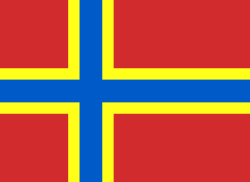 | 2007 on | Flag of Orkney[37][93] | A blue Nordic cross outlined in yellow on a red field. |
 | 14 April 2010 | Flag of the Isle of Portland (Registered by the Flag Institute)[94] | The colours represent the landscape of the area: Portland stone, grass and the sea. The white tower represents the castles and the naval coronet shows the long connection with the Royal Navy.[95] |
 | February 2002 | Flag of the Isles of Scilly[37] | The Scillonian Cross |
 | 2017 on | Flag of South Uist[37][93] | A green flag bearing a blue Nordic cross fimbriated in white |
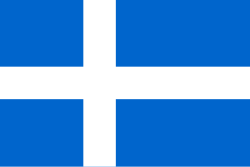 | 1969 on | Flag of Shetland[37][93] | A white Nordic cross on a light blue field |
 | 2020 on | Flag of the Isle of Skye[37][93] | A yellow Hebridean Birlinn in upper hoist above a yellow Nordic Cross on a sky blue field interlaced with a white ring. |
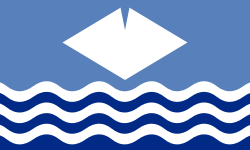 | 2009 on | Flag of the Isle of Wight[37] | A pale blue field with a nicked rhombus (a representation of the island's shape) and at the bottom six alternating bars wavy, navy blue and white. |
University flags
| Flag | Date | Use | Description |
|---|---|---|---|
 | Flag of Bangor University[96] | ||
 | Flag of Edinburgh Napier University | A flag diagonally divided by white and red – white in the top and fly, red in the hoist and bottom. | |
 | Flag of Queen's University Belfast | ||
 | Flag of the University of Bristol | ||
 | Flag of the University of Cambridge[97] | ||
 | Flag of the University of East Anglia | ||
 | Flag of the University of Edinburgh | A blue saltire on a white field, with a thistle in the upper quarter, a castle in the lower quarter, and an open book in the centre of the saltire. It is a banner of the University's coat of arms. | |
 | Flag of the University of Glasgow | ||
 | Flag of the University of Hull | The Cross of Saint George defaced in the centre with the University's coat of arms. | |
 | Flag of the University of London | ||
 | Flag of the University of Oxford | An open book with the inscription Dominus Illuminatio Mea (Latin for "The Lord is my light"), surrounded by three golden crowns (two above and one below) on a blue field. | |
 | Flag of the University of Roehampton[98] | ||
 | Flag of the University of St Andrews | A banner of the University's coat of arms. | |
 | Flag of Swansea University | ||
 | Flag of Wrexham Glyndŵr University | ||
 | Flag of the University of Warwick |
Miscellaneous
| Flag | Date | Use | Description |
|---|---|---|---|
 | 2016 on | Flag of the Flag Institute | |
 | Flag of the Royal National Lifeboat Institution[citation needed] | A red cross with a blue border on a white field, with the letters RNLI in red in each quarter, defaced with a crowned anchor. | |
 | Flag of the St John Ambulance Brigade[citation needed] | ||
 | A Branch Standard of the Royal British Legion[citation needed] | A blue ensign with a yellow band across the middle with the words Royal British Legion and the name of the branch. | |
 | Flag of Saint David | A gold cross on a black field. This is flown in Wales especially on St David's Day. This flag and the St Patrick's flag are not considered national flags but may be flown without special consent.[99] | |
 | Flag of Saint Aldhelm | A white cross on a red field. | |
 | 2021 on | Flag of Saint Augustine of Canterbury[100] | A white cross on a black field with a gold bishop's pallium topped by a small gold cross in the canton. |
 | Flag of Saint Edmund the Martyr | A red Saint George's Cross on a white field, defaced in the centre with a blue shield bearing two crossed gold arrows passing through a gold crown. | |
 | Flag of Saint Peter, Westminster Abbey | Two crossed gold keys beneath a gold ring on a field of red. The symbols represent the two Patron Saints of the Abbey: the ring of Saint Edward the Confessor (founder of the Abbey), and the keys of Saint Peter. | |
 | Flag of Saint Richard of Chichester | A white cross on a red field with a white chalice in each quarter. | |
 | 1878 on | Flag of the Salvation Army[citation needed] | A maroon flag with a blue border defaced by a yellow star with the Salvation Army's motto "Blood & Fire" written on it. |
    | Suggested redesigns of the Union Jack, including one with the red dragon from the flag of Wales added in the centre; two variations with the inclusion of yellow from the flag of Saint David; and one with the inclusion of the green element of the flag of Wales. | The current UK flag (the Union Jack) holds symbolism from England, Scotland, and Northern Ireland, but lacks any symbolism of the only other UK nation in Wales. Therefore, it has been suggested the Union Jack be redesigned to include representation of Wales or a completely new or alternate flag be used.[101][102] | |
 | 1816 to at least 1935 | British republican flag proposal used within the Chartism movement. | A British republican flag, which originated in 1816, in use until at least 1935.[103] |
 | British republican flag proposal within the Chartism movement. | The Republican tricolour proposed by Hugh Williams in 1838 and described in LJ "Spartacus" Linton's 1851 poem"Our Tricolour".[104] |
Historic areas
Summarize
Perspective
It is explicitly permitted to fly the flag of the Black Country, East Anglia, Wessex, any Part of Lincolnshire, any Riding of Yorkshire or any historic county within the United Kingdom without needing any permission or consent.[31]
Kingdoms
| Flag | Date | Use | Description |
|---|---|---|---|
 | 1900 on | Flag of East Anglia.[37] | The arms ascribed to the Wuffingas dynasty of East Anglia, three crowns on a blue shield, superimposed on a St George's cross (Registered by the Flag Institute)[105]. |
 | c.13th century / 2014 on[106] | Flag of Mercia[107] – the Cross of St Alban | A gold saltire on a blue field; the traditional flag of the Kingdom of Mercia, still flown on Tamworth Castle. |
 | Ancient | Kingdom of Northumbriaregcoa North England Modern Northumbria (Northumberland and the county of Durham) | The oldest flag in England. Eight alternating stripes[a] |
 | 1970s | Flag of Wessex[37] | A gold wyvern on a red field. (Registered by the Flag Institute)[108] |
Counties
| Flag | Date | Use | Description |
|---|---|---|---|
 | 2023 on | Flag of Aberdeenshire | Party per pale or and purpure; on a castle triple-towered argent an ancient crown party per pale of the second and first. (Chosen by competition)[109](Registered by the Flag Institute)[110] |
 | 2014 on | Flag of Anglesey | Gules between three lions rampant or a chevron of the second: the attributed arms of Hwfa ap Cynddelw, the traditional badge of the county. (Registered by the Flag Institute)[111] |
 | 2023 on | Flag of Banffshire | Orange top half, with the sun in white in the upper hoist, over white and blue stripes and five counter-changed roundels in the form of a railway viaduct. (Chosen by competition)[112](Registered by the Flag Institute)[113] |
 | 2014 on | Flag of Bedfordshire | Based on the arms of Beauchamp, Barons of Bedford (red and gold) and Russell, Dukes of Bedford (black with 3 scallops). Unlike the old county council banner, the bars wavy are counterchanged per pale. (Registered by the Flag Institute)[114] |
 | 2017 on | Flag of Berkshire | Based on the traditional badge of the county: a stag beneath Hearne's Oak. (Registered by the Flag Institute)[115] |
 | 2023 on | Flag of Berwickshire | A horozontal blue and green bicolour divided in the middle by a white chain, with a leaping silver salmon in the blue section, and a curved gold ear of barley in the green section. |
 | 2011 on | Flag of Buckinghamshire | A red and black field bearing a chained swan: a traditional badge of the county. (Registered by the Flag Institute)[116](Chosen in a BBC competition)[117] |
 | 2012 on | Flag of Caernarfonshire | Vert, three eagles displayed in fess Or. (Registered by the Flag Institute)[118] |
 | 2016 on | Flag of Caithness | A Scandinavian cross flag for the county's Norse heritage, with the civic badge of Caithness, a ship with a raven on its sail, in the upper hoist. (Registered by the Flag Institute)[119](Enrolled by the Lord Lyon)[120] |
 | 2015 on | Flag of Cambridgeshire | Blue with wavy lines in Cambridge blue, and the three crowns of East Anglia. (Registered by the Flag Institute)[121](Chosen by competition)[122] |
 | 2013 on | Flag of Cheshire | Azure a Sword erect between three Garbs Or (Registered by the Flag Institute)[123] |
 | 12th century | St Piran's Flag – the Flag of Cornwall | A white cross on a black field. (Registered by the Flag Institute)[124] |
 | 2012 on | The Flag of Cumberland | Based on a banner of the arms of the former Cumberland County Council.(Registered by the Flag Institute)[125] |
 | 2006 on | Flag of Derbyshire | A green cross with a white border on a sky blue field, with a gold Tudor rose in the centre. (Registered by the Flag Institute)[126](Chosen in a BBC competition)[127] |
 | 2003 on | Flag of Devon – St Petroc's flag | A white cross with a black border on a green field. (Registered by the Flag Institute)[128](Chosen by competition)[129] |
 | 2008 on | Flag of Dorset[130] – the Dorset Cross alias St Wite's Cross | A white cross with a red border on a gold field.(Registered by the Flag Institute)[131](Chosen by competition)[132] |
 | 2013 on | Flag of County Durham[133] | A gold and blue horizontal bicolour with St. Cuthbert's Cross countercharged upon it. (Registered by the Flag Institute)[134](Chosen by competition)[135] |
 | 2018 on | Flag of East Lothian (Haddingtonshire) | A blue field with a gold saltire voided blue; over all a lozenge with a lion rampant. (Registered by the Flag Institute)[136](Chosen by competition)[137] |
 | Possibly 6th century | Flag of Essex | A red field with three white, gold hilted Saxon swords (Seaxes). (Registered by the Flag Institute)[138] |
 | 2015 on | Flag of Flintshire | Argent, between four Cornish choughs sable a cross engrailed flory of the second. (Registered by the Flag Institute)[139]; the arms attributed to Edwin Tegeingl (Edwin ap Gronwy) |
 | 12th century | Flag of Glamorgan | Gules, three Chevronels Argent. (Registered by the Flag Institute)[140] |
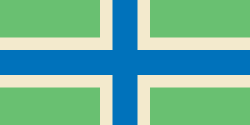 | 2008 on | Flag of Gloucestershire – the Severn Cross | The winning entry in a competition to commemorate the county's millennium. (Registered by the Flag Institute)[141](Chosen by competition)[142] |
 | 2019 on | Flag of Hampshire | A gold Saxon crown on a red field above a Tudor rose on a gold field.(Registered by the Flag Institute)[143] |
 | 2019 on | Flag of Herefordshire | On a dark red background, a white bull's head above three wavy lines, ordered white-blue-white.(Registered by the Flag Institute)[144] |
 | 2008 on | Flag of Hertfordshire | On a waved background, a Hart reclining on a yellow shield – a flag displayed on the crest of the county arms(Registered by the Flag Institute)[145]A banner of the council's arms[146] |
 | 2009 on | Flag of Huntingdonshire | On a green background, a gold, ribboned hunting horn – a flag displayed on the crest of the county arms (Registered by the Flag Institute)[147] |
 | 1605 on | Flag of Kent[148] | A red field with the white horse of Kent. (Registered by the Flag Institute)[149] |
 | 2016 on | Flag of Kirkcudbrightshire | A green and white quartered field bearing the Cross of St Cuthbert (from whom the county is named). (Registered by the Flag Institute)[150](Enrolled by the Lord Lyon)[151] |
 | 2008 on | Flag of Lancashire | The red rose of Lancashire on a yellow field. (Registered by the Flag Institute)[152] |
 | 2021 on | Flag of Leicestershire | Per fess dancetty gules and argent, a cinquefoil pierced ermine above a fox gules. (Registered by the Flag Institute)[153] |
 | 2005 on | Flag of Lincolnshire | Quarterly Vert and Azure, on a Cross Gules fimbriated Or a Fleur-de-Lis of the last. (Registered by the Flag Institute)[154](Chosen in a BBC competition)[155] |
 | 2015 on | Flag of Merionethshire | Azure, three goats rampant Argent, armed and unguled Or; from the dexter base the sun in his splendour issuant Or. (Registered by the Flag Institute)[156] |
 | 1910 | Flag of Middlesex | A red field with three white, gold hilted Saxon swords or Seaxes under a gold Saxon crown. (Registered by the Flag Institute)[157] |
 | 2011 on | Flag of Monmouthshire | Per pale Azure and Sable three Fleurs-de-lis Or. (Registered by the Flag Institute)[158] |
 | 2023 on | Flag of Morayshire | A green strip in the hoist bearing a gold wheatsheaf; orange over blue with a wavy division. (Chosen by competition)[159](Registered by the Flag Institute)[160] |
 | 2014 on | Flag of Norfolk | Party per pale or and sable, a bend ermine; the attributed arms of Ralph de Gael or Guader, 1st Earl of Norfolk (Registered by the Flag Institute)[161] |
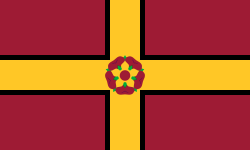 | 2014 on | Flag of Northamptonshire | Maroon with a gold cross fimbriated black, and in the centre the county's traditional rose.[162] (Registered by the Flag Institute)[163](Chosen by competition)[164] |
 | 1951 | Flag of Northumberland | Local authority flag with use permitted to local people. Based on the St Oswald banner. (Registered by the Flag Institute)[165] |
 | 2011 on | Flag of Nottinghamshire | A red cross fimbriated white on a green field, with an inescutcheon in the centre showing Robin Hood. (Registered by the Flag Institute)[166](Chosen in a BBC competition)[167] |
 | 2007 on | Flag of Orkney[37][93] | A blue Nordic cross outlined in yellow on a red field. (Registered by the Flag Institute)[168](Enrolled by the Lord Lyon)[169] |
 | 2017 on | Flag of Oxfordshire | The arms of the pre-1974 County Council: blue with a red ox head on a double bend wavy, between a wheatsheaf and an oak. (Registered by the Flag Institute)[170] |
 | 1988 on | Flag of Pembrokeshire | A yellow cross on a blue field with a variation of the red and white Tudor rose in the centre. (Registered by the Flag Institute)[171] |
 | 2015 on | Flag of Rutland | A green field strewn with acorns and a golden horseshoe in the centre. (Registered by the Flag Institute)[172] |
 | 1969 on | Flag of Shetland | A white Nordic cross on a light blue field. (Registered by the Flag Institute)[173](Enrolled by the Lord Lyon)[174] |
 | 2012 on | Flag of Shropshire | Three leopards' faces, referred to as loggerheads locally, are a traditional emblem for Shropshire and its county town, Shrewsbury. The erminois aspect differentiates the county flag with that of Shrewsbury. (Registered by the Flag Institute)[175]A banner of the council's arms[176] |
 | 2013 on | Flag of Somerset | Or, a Dragon Rampant Gules. (Registered by the Flag Institute)[177](Chosen by competition)[178] |
 | 2016 on | Flag of Staffordshire | A red chevron on gold, with the Stafford knot.(Registered by the Flag Institute)[179](Chosen by competition)[180] |
 | 2017 on | Flag of Suffolk | A Saxon crown pierced with two arrows: the traditional emblem of St Edmund, and of Suffolk.(Registered by the Flag Institute)[181] |
 | 2014 on | County Flag of Surrey | Chequy or and azure (De Warrenne, the first Earls of Surrey) – the traditional emblem of the county.(Registered by the Flag Institute)[182] |
 | 2010 on | Flag of Sussex – Saint Richard's Flag[37] | Based on the traditional emblem of Sussex; Six gold martlets on a Blue field, first recorded in 1611 and used by many Sussex organisations. (Registered by the Flag Institute)[183] |
 | December 2018 on | Flag of Sutherland | White with a black saltire intersecting a black Scandinavian cross, a sun figure in the centre. This design won a local competition, replacing a previous winner (a swooping eagle counterchanged against a vertical bicoloured red and yellow background, with three mullets at the hoist).[184] (Registered by the Flag Institute)[185] |
 | August 2016 on | Flag of Warwickshire | A bear and ragged staff (the badge of the Earls of Warwick) which has become a symbol of the county, white on red. (Registered by the Flag Institute)[186] |
 | 2011 on | Flag of Westmorland | A golden heraldic apple tree on white and red bars. (Registered by the Flag Institute)[187] |
 | 2009 on | Flag of Wiltshire | Alternating downward angled stripes of green and white bearing a green disc within six alternating green and white sections, on which stands an image of a great bustard. (Registered by the Flag Institute)[188][189] Accepted by Wiltshire Council in December 2009[190] |
 | 2013 on | Flag of Worcestershire | Three black pears on a shield charged against a wavy green and blue background. (Registered by the Flag Institute)[191](Chosen in a BBC competition)[192] |
 | 1960s on | Flag of Yorkshire | A White Rose on a blue field. (Registered by the Flag Institute)[193] |
Ridings of Yorkshire
| Flag | Date | Use | Description |
|---|---|---|---|
 | 2013 on | Flag of the East Riding of Yorkshire[194] | Per pale Azure and Vert, an inverted rose Argent. (Registered by the Flag Institute)[195](Chosen by competition)[196] |
 | 2013 on | Flag of the North Riding of Yorkshire[197] | Vert a cross azure fimbriated or, a rose argent (Registered by the Flag Institute)[198](Chosen by competition)[199] |
 | 2013 on | Flag of the West Riding of Yorkshire[200] | (Registered by the Flag Institute)[201](Chosen by competition)[202] |
Other regions
| Flag | Date | Use | Description |
|---|---|---|---|
 | 2012 on | Flag of the Black Country[37][203] | Per pall reversed Sable, Gules and Argent a pall reversed Argent over all an inverted chevron of chain counterchanged Argent, Sable, Argent. (Registered by the Flag Institute)[204] |
 | 2017 on | Flag of the Cinque Ports[37] | Three gold ships' hulls on a blue field. (Registered by the Flag Institute)[205] |
 | 2014 on | Flag of Exmoor[206] | A purple field as the main base with violet and green waves separated by parallel white lines underneath. A white stag and star holds the top left corner. Exmoor remains the only moorland with its own flag to this day. (Registered by the Flag Institute)[207] (Chosen by competition)[208] |
Historical flags
National flags and ensigns
| Flag | Date | Use | Description |
|---|---|---|---|
 | 1929–1973 | Ensign of the former Northern Ireland government. | The blue ensign defaced with the letters GNI. Used on vessels of the Northern Ireland government. |
 | 1924–1972 | The Ulster Banner – Flag of the former Government of Northern Ireland between 1953 and 1972 and still used to represent Northern Ireland in some sporting events in which Northern Ireland competes. The flag is particularly associated with the loyalist and unionist communities in Northern Ireland. | A red cross on a white field with a red hand, on a six pointed white star, crowned (representing the six counties in Northern Ireland). The Ulster Banner ceased to be officially recognised with the passing of the Northern Ireland Constitution Act 1973 which dissolved the Parliament of Northern Ireland. |
 | 1707–1801 | Flag of the Kingdom of Great Britain | First version of the Union Jack used in England from 1606 and Scotland from 1707 – the Flags of England and Scotland superimposed. |
 | 17th century | Scottish Union Flag | Scottish Union Flag variant[209][210][211][212] |
 | 1783–1922 | Saint Patrick's Saltire, also known as St Patrick's Cross, the symbol of The Most Illustrious Order of Saint Patrick, the British order of chivalry associated with Ireland. | A red saltire on a white field. Used to represent Ireland in the Union Jack and unofficially to represent Ireland from the Act of Union to the Anglo-Irish Treaty. |
 | 1620–1707 | English Red Ensign | The Red Ensign of the English Royal Navy |
 | 1620–1707 | English White Ensign | The White Ensign of the English Royal Navy |
 | 1620–1707 | English Blue Ensign | The Blue Ensign of the English Royal Navy |
 | Until 1707 | Scottish Red Ensign, used by the Royal Scottish Navy | A red ensign with the Flag of Scotland in the canton |
 | 1707–1801 | Red Ensign of Great Britain | The Red Ensign with the first version of the Union Jack. (This was the flag flown over the Thirteen Colonies before the American Revolution) |
 | 1707–1801 | White Ensign of Great Britain | The White Ensign with the first version of the Union Jack. |
 | 1707–1801 | Blue Ensign of Great Britain | The Blue Ensign with the first version of the Union Jack. |
 | 1649–1651 | Flag of the Commonwealth of England | St George's Cross and an Irish Harp juxtaposed. |
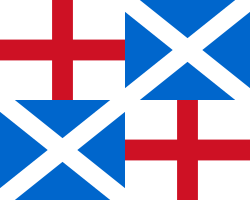 | 1651–1658 | Flag of the Commonwealth of England | St George's Cross and St Andrew's cross quartered. |
 | 1658–1660 | Flag of The Protectorate | The 1606 Union Jack defaced with an Irish Harp. |
 | 1925–1936 | King's Colour for the Royal Navy | A White Ensign defaced in the centre of the cross with a garter of the Order of the Garter encircling the Royal Cypher of King George V and surmounted by a Tudor Crown. |
 | 1936–1952 | King's Colour for the Royal Navy | A White Ensign defaced in the centre of the cross with a garter of the Order of the Garter encircling the Royal Cypher of King George VI and surmounted by a Tudor Crown. |
 | 1952–2022 | Queen's Colour for the Royal Navy | A White Ensign defaced in the centre of the cross with a garter of the Order of the Garter encircling the Royal Cypher of Queen Elizabeth II and surmounted by a Saint Edward's Crown. |
Lord Protector's standard
| Flag | Date | Use | Description |
|---|---|---|---|
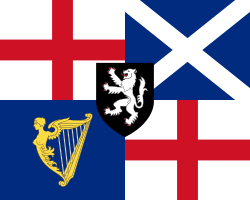 | 1653–1659 | Standard of the Lord Protector | The cross of St. George quartered with the cross of St. Andrew and the Irish Harp, and surmounted by an escutcheon with Cromwell's personal coat of arms. |
Royal standards
| Flag | Date | Use | Description |
|---|---|---|---|
 | 1198–1340 | Royal Banner of King Richard I | Gules, three lions passant regardant in pale or. |
 | 1340–1395 1399–1406 | Royal Banner of King Edward III | The Coat of Arms of England quartered with the Royal Standard of France, the Fleur-de-lis representing the English claim to the French throne. |
 | 1395–1399 | Royal Banner of King Richard II | The Coat of Arms of England impaled with attributed Arms of King Edward The Confessor (symbolising mystical union). |
 | 1406–1422 1461–1470 1471–1554 1558–1603 | Royal Banner of King Henry IV | The French quartering has been altered to three fleurs-de-lys. |
 | 1422–1461 1470–1471 | Royal Banner of King Henry VI | The Coat of Arms of France impaled with the Coat of Arms of England. |
 | 1554–1558 | Royal Banner of Queen Mary I and King Philip | The Coat of Arms of Habsburg Spain impaled with the Coat of Arms of England. |
 | 1603–1649 1660–1689 1702–1707 | Royal Standard of the House of Stuart, used first by James VI and I | A banner of the Royal Coat of Arms of James I, first and fourth quarters representing England and the English claim to the French throne, second quarter representing Scotland, third quarter representing Ireland (This is the first time that Ireland has been represented on the Royal Standard). |
 | 1689–1694 | Royal Standard of King William III and II and Queen Mary II | A banner of the joint Royal Coat of Arms of William III and Mary II, consisting of the Coat of Arms of England defaced with an inescutcheon for the House of Nassau (representing William) and impaled with another undefaced version of the same Coat of Arms (representing Mary). |
 | 1694–1702 | Royal Standard of King William III and II | A banner of the Royal Coat of Arms of William III, first and fourth quarters representing England and the English claim to the French throne, second quarter representing Scotland, third quarter representing Ireland, with an inescutcheon for the House of Nassau. |
 | 1707–1714 | Royal Standard of the House of Stuart, under Queen Anne after the Acts of Union | A banner of the Royal Coat of Arms of Queen Anne, first and fourth quarters representing (newly unified) England and Scotland, second quarter representing the British claim to the French throne, third quarter representing Ireland. |
 | 1714–1801 | Royal Standard of Great Britain under the House of Hanover from 1714 to 1801 | A banner of the Royal Coat of Arms of Great Britain, first quarter representing England and Scotland, second quarter representing the British claim to the French throne, third quarter representing Ireland, fourth quarter representing the Electorate of Hanover. |
 | 1801–1816 | Royal Standard of the United Kingdom from 1801 to 1816 | A banner of the Royal Arms from the creation of the United Kingdom on 1 January 1801; first and fourth quarters for England and Wales, second Scotland, third Ireland, with an inescutcheon for the Electorate of Hanover. |
 | 1816–1837 | Royal Standard of the House of Hanover from 1816 to 1837 | The Royal Arms after Hanover had become a kingdom. |
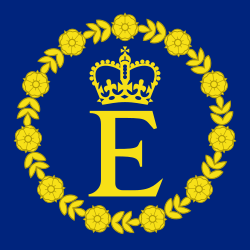 | 1960–2022 | Personal Flag of Elizabeth II, used by the Queen in her capacity as Head of the Commonwealth | A crowned letter 'E' in gold, surrounded by a garland of gold roses on a blue background. |
Royal consorts
| Flag | Date | Use | Description |
|---|---|---|---|
 | 1952–2021 | Standard of Prince Philip, consort of Elizabeth II | A banner of the Coat of Arms of the Duke of Edinburgh, 1st quarter representing Denmark, 2nd quarter Greece, 3rd quarter the Mountbatten family, 4th quarter Edinburgh. |
 | 1936–2002 | Standard of Queen Elizabeth, consort of George VI | The Royal Coat of Arms of the United Kingdom impaled with the Arms of the Earl of Strathmore: ("bows" and "lions"). |
 | 1910–1953 | Standard of Queen Mary, consort of George V | The Royal Coat of Arms of the United Kingdom impaled with the Arms of Prince Francis, Duke of Teck (the Queen's father) and Prince Adolphus, Duke of Cambridge (the Queen's maternal grandfather). |
 | 1901–1928 | Standard of Queen Alexandra, consort of Edward VII | The Royal Coat of Arms of the United Kingdom impaled with the Arms of the King of Denmark. |
 | 1840–1861 | Standard of Prince Albert, consort of Victoria | The Royal Coat of Arms of the United Kingdom defaced with a three-point label (with the second point charged with the Cross of St. George), quartered with the arms of Saxony. |
 | 1830–1849 | Standard of Queen Adelaide, consort of William IV | The Royal Coat of Arms of the United Kingdom (1816–1837) impaled with the arms of her father, Duke Georg I of Saxe-Meiningen. |
 | 1820–1821 | Standard of Queen Caroline, consort of George IV | The Royal Coat of Arms of the United Kingdom (1816–1837) impaled with the arms of her father, Charles William Ferdinand, Duke of Brunswick. |
 | 1816–1818 | Standard of Queen Charlotte, consort of George III | The Royal Coat of Arms of the United Kingdom (1816–1837) impaled with the arms of her father, Duke Charles Louis Frederick of Mecklenburg-Strelitz. |
 | 1801–1816 | The Royal Coat of Arms of the United Kingdom (1801–1816) impaled with the arms of her father, Duke Charles Louis Frederick of Mecklenburg-Strelitz. | |
 | 1761–1801 | The Royal Coat of Arms of Great Britain (1714–1801) impaled with the arms of her father, Duke Charles Louis Frederick of Mecklenburg-Strelitz. | |
 | 1727–1737 | Standard of Queen Caroline, consort of George II | The Royal Coat of Arms of Great Britain (1714–1801) impaled with the arms of her father, John Frederick, Margrave of Brandenburg-Ansbach. |
Welsh Royal Standards
This section may be too technical for most readers to understand. (September 2010) |
| Flag | Date | Use | Description |
|---|---|---|---|
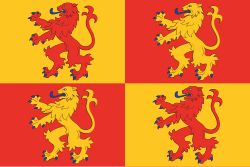 | 1401–1416 | Banner adopted by Owain Glyndŵr and thought to be derived from the counter-charged arms of the princely Houses of Mathrafal and Dinefwr. It is in use by the National Eisteddfod for Wales, Cymdeithas yr iaith and widely amongst independentist groups | Quarterly Or and Gules, four Lions rampant counter-charged |
 | c. 1195 – 1378 | Banner of the princely House of Aberffraw and the Kingdom of Gwynedd famously used by Llywelyn the Great, Llywelyn ap Gruffudd and Owain Lawgoch. The Prince of Wales uses a version of this flag today emblazoned with a Crown on a green shield | Quarterly Or and Gules, four Lions passant guardant counter-charged langued and armed Azur |
 | c. 1100 – c. 1400 | Banner of the princely House of Mathrafal used during the early Middle Ages by the rulers of Powys, Powys Wenwynwyn and later by their heirs the de la Pole (Powysian) dynasty. Modern use is rare | Or a Lion rampant Gules langued and armed Azure |
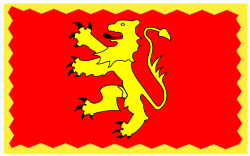 | c. 1100 – c. 1300 | Banner of the princely House of Dinefwr and the Kingdom of Deheubarth, a realm which covered much of south Wales. The banner would have been used during the early Middle Ages and later by the Talbot dynasty who inherited the arms. Modern use is rare | Gules a Lion rampant Or, a border engrailed of the last |
 | c. 1240 – 1282 | Banner of the personal arms of Llywelyn ap Gruffudd | Argent three Lions passant Gules |
 | c. 1160 – c. 1350 | Banner of Madog ap Gruffudd Maelor, and later the Banner of Powys Fadog | Argent a Lion rampant Sable langued and armed Gules |
Battle flags
| Flag | Date | Use | Description |
|---|---|---|---|
 | 13th century | Banner known as Y Groes Nawdd or "The Cross of Neith" said to have been the battle flag of Llywelyn ap Gruffudd (d. 1282) | Purpure a celtic cross Or |
 |
c. 1400–1416 | Banner known as the Y Ddraig Aur or 'Golden Dragon' which has ancient origins. It was famously raised over Caernarfon during the Battle of Tuthill in 1401 by Owain Glyndŵr | Argent a dragon rampant Or |
County flags
| Flag | Date | Use | Description |
|---|---|---|---|
 | pre–2007 | Unofficial flag of Orkney | A red Nordic cross on a yellow field (the Cross of Saint Magnus). It was denied formal recognition by the Lord Lyon in 2001, due to similarity with other national flags, as well as the flag of the former Kalmar Union. |
 | pre–2008 | Unofficial flag of Lancashire | The Red Rose of Lancashire on a white field. It was denied registration by the Flag Institute, due to being almost identical to the already registered flag of the town of Montrose, Angus. |
 | 2018 | Flag of Sutherland | A swooping eagle, seen face on, against a vertical bicoloured red and yellow background, with the eagle counterchanged yellow and red; At the hoist three stars or mullets. Was originally unveiled as the Flag of Sutherland in February 2018, but was placed on hold due to backlash from residents. A public vote beginning in October 2018 led to the retirement of this flag in favour of the current design. |
See also
Notes
References
External links
Wikiwand - on
Seamless Wikipedia browsing. On steroids.
